Can linseed oiled floors stand up to wet kitchen conditions?
A B
5 years ago
last modified: 5 years ago
Featured Answer
Sort by:Oldest
Comments (16)
Related Discussions
manager supports terrible living conditions! help!
Comments (34)This makes for interesting reading. It is clear that Lucy thinks that manhattanmatt is a crazed lunatic because what he is saying CAN'T POSSIBLY be true. Only it is true. Lucy, how can you be arguing this without at least taking two minutes to research and try and understand how this antiquated system works? You just think it sounds so crazy that Matt must be lying. Well it's true. Sad but true. My old market had rent control. Even in owner occupied two or three family homes, rent control is in full force, EVEN IF THE APARTMENT IS VACANT!!! Example: You have a rental unit inside your own house that you live in that is vacant and ready for a new tenant. It should be worth $2200/ month, but you can only charge $1100/ month. You're not kicking some poor, hard done by tenant to feed your own evil landlord greed - the place is vacant. You are free to rent it to anyone. Yet the rent is still controlled. WHY?????? I simply don't understand it. It makes absolutely no sense. So while the owner/ landlords expenses and real estate taxes go through the roof (some of these homes are now worth 1 - 2 Million dollars with re-assessed taxes to match), yet the owner cannot charge a market rent for a vacant unit. So Lucy, is it all the owners fault? They should move because they can't afford their taxes and the tenant holds all the cards? You could rent the apartment to someone with a 6 figure income (maybe someone making more than the owner) and yet the apartment will still be rent controlled. The situation in these big buildings is much, much worse. At least the house has some value because an owner can move in, and if it's less than a three family they can kick all tenants out and make it a one family. So out with the middle classes who need the income and in with the rich. Is this a better situation to you lucy? The big buildings have NO VALUE because no-one wants them. Some people take a risk, buy the buildings and then try and buy tenants out. Why should they have to pay a tenant thousands of dollars to move out of a place which is not owned by them? It is supremely unfair. I do actually think that there is a place for rent control. If it were subsidized by the government. The government put these rules in place and it should pay to keep them running. Why on earth should a poor unfortunate owner be bankrupted by something over which they have no control? I am not surprised that Matt got het up - it is very aggravating having truth dismissed by someone who clearly knows nothing at all about the subject....See Moreanyone using oiled wood floors (not polyurethane)?
Comments (37)Shilpsb - Overall I like them (Garrison French Connection Provence), I like the natural color and the low sheen...but there are some areas where it does seem like there's a haze although it blends into the different planks. I probably am the only one that can tell! I haven't had problems yet with staining, I just wipe up water as soon as I see it and then clean with the Woca spray whenever I spill anything. I have done the refresher a couple times but have not done the re-oiling... is that a product you can buy? For the rugs, I have put a couple World Market small 2'x3" with the rug mat underneath... they were inexpensive and I just wanted to get something until I can do more decorating - they are too small but they do the trick. What do they say could happen to the floors with rubber backing? I know they say no blue tape, etc... I've been very conscientious with these floors, but they do have a lot of variance in color and look rustic so I'm just going with it. I would rather be eco-friendly anyway. I heard about some at Plastica which are pvc and can wiped clean...http://plasticastore.com/shop/home/moroccan-pattern-mat/...See Morehas anyone put down oiled wood floors?
Comments (137)Tung-oiled pine flooring update. It's been a year since my last post in this thread, and a year and a half from the floor install, so I thought I would post an update. Some backstory: These pine wide-boards were sawn at a local mill, kiln dried and I think indoors for abt a year before we got it. The boards sat in our house for 6 months before actual install. During that time, I sanded each board and applied and buffed in 4 coats of Hope's Pure Tung Oil. They were installed on our second floor, all bedrooms. Once installed, I buffed in one more coat of tung oil. Today. I am very pleased with how the tung-oil is protecting the floor, and how the floor is holding up. Not seeing much gap between boards, and any accidental spills are not leaving any stains, but I do get to them fairly fast. For clean up, we vacuum and when needed, use damp rag and elbow grease for any scuffs, or marks (dog paws), etc. I occasionally buff out scratches with tung oil (we have a dog and 11yo boy). Since the floor has gone thru one dry winter, this summer I plan buff in another coat of tung oil for more durability. Because it is pine, we do not allow shoe traffic on the second floor or food, but that rule was same when the flooring was carpeted. I love this floor! The patina is becoming quite lovely, it has been really easy to keep. I expect the floor to age gracefully and develop more character as the years go on. I do not regret going the all-natural route with using only the tung oil....See MorePainting kitchen cabinets--oil vs latex--VOCs concern
Comments (15)I wouldn't focus "totally" on just the $$$... Think of the "Total $ value" added to the home, etc. >>> I think some people tend to think too "small box" when improving their homes, and get too concerned over the price of a single gallon of product. >>> Yet $$Thousands$$ are spent on furniture, tiles, etc., that can easily be "too trendy", and REDUCE a homes value! If another $100 (or whatever $ amount...) in paint adds "even more" to the worth....just sayin'.... The additional $$/sq. ft. soon become meaningless. Plus, a high-end finish like FPE wears VERY well too. However... CC is a very good finish. It's NOT Low-VOC however. Colors can be tedious to match into this line. The ACE Cabinet, Door, & Trim paint IS Low-VOC, looks very nice, easily tinted to ANY ACE color, and can be sold in all 50 states...CC cannot. ...gettin' off my soapbox now...;-) Faron...See MoreA B
5 years agoA B
5 years agoOak & Broad
5 years agoUser
5 years agoA B
5 years agolast modified: 5 years ago
Related Stories

CONCRETEConcrete Flooring Stands Up to the Test in the Kitchen
Find out whether this durable and customizable flooring material might be right for your kitchen
Full Story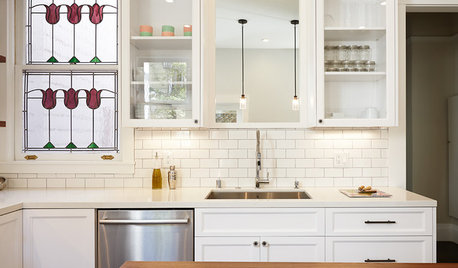
KITCHEN DESIGNKitchen of the Week: A Dark Kitchen Brightens Up
A cooking space honors the past while embracing the present
Full Story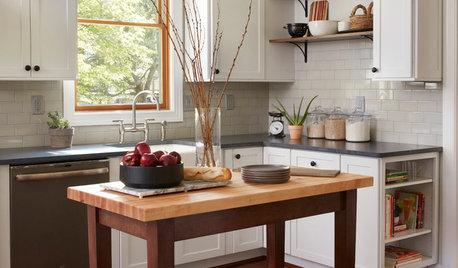
KITCHEN DESIGNKitchen of the Week: A Cottage Kitchen Opens Up
A Maryland remodel balances modern needs and architectural integrity in a kitchen designed for gatherings
Full Story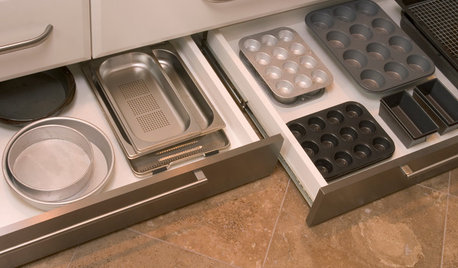
KITCHEN DESIGNThe Kitchen Storage Space That Hides at Floor Level
Cabinet toe kicks can cleverly house a bank of wide drawers — or be dressed up to add a flourish to your kitchen design
Full Story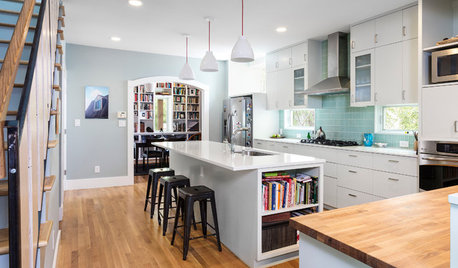
MOST POPULAR6 Kitchen Flooring Materials to Boost Your Cooking Comfort
Give your joints a break while you're standing at the stove, with these resilient and beautiful materials for kitchen floors
Full Story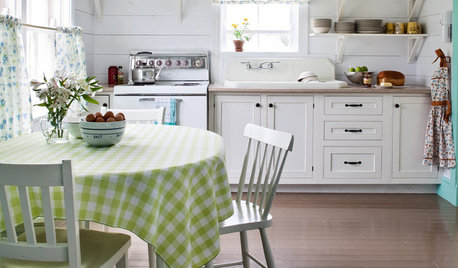
KITCHEN DESIGNThe Cure for Houzz Envy: Kitchen Touches Anyone Can Do
Take your kitchen up a notch even if it will never reach top-of-the-line, with these cheap and easy decorating ideas
Full Story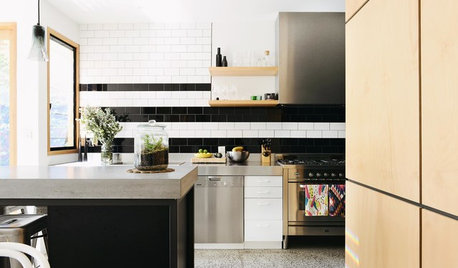
COLOR10 Pair-Ups for Black in the Kitchen
Combine black with other colors to add drama, polish and modernity. It also can make a kitchen look more spacious
Full Story
KITCHEN DESIGN13 Alternatives to Plain Wood Flooring in the Kitchen
Graphic patterns, surprising transitions and unexpected materials make these kitchen floors stand out
Full Story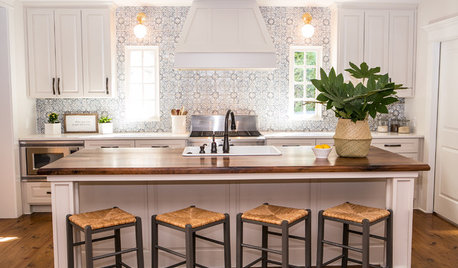
BEFORE AND AFTERSKitchen of the Week: Saving What Works in a Wide-Open Floor Plan
A superstar room shows what a difference a few key changes can make
Full Story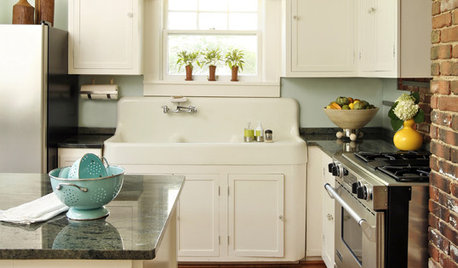
KITCHEN DESIGNHow to Set Up a Kitchen Work Triangle
Efficiently designing the path connecting your sink, range and refrigerator can save time and energy in the kitchen
Full Story




Patricia Colwell Consulting